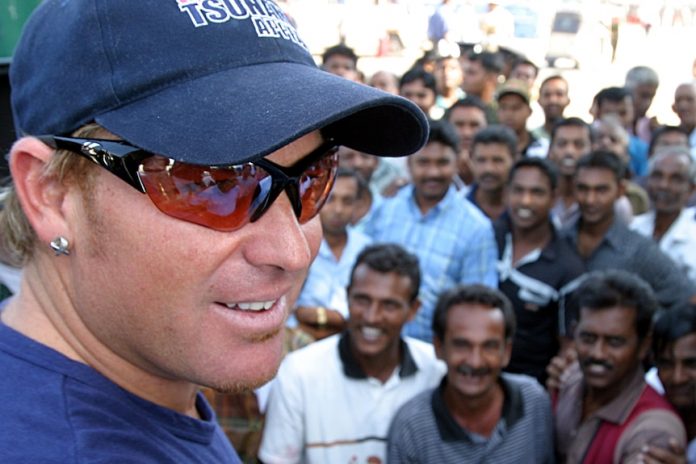In the late 1990s, Shane Warne wasn’t very well loved in the cricket-obsessed island nation of Sri Lanka. He may have been respected for his incredible talent, but local cricketers accused him of being overly competitive on the pitch.
He also lost fans because of comments he made about Sri Lankan players. At one point, he said he “didn’t like” the country’s captain at the time, Arjuna Ranatunga.
That collective feeling of animosity towards Shane Warne shifted for Sri Lankans thanks to an act of goodwill that helped some of the country’s most disadvantaged kids after the Boxing Day tsunami in 2004.
More than 200,000 people around the world died when an earthquake triggered a massive tsunami in the Indian Ocean.
Sri Lanka’s death toll of about 30,000 was second only to Indonesia.
Dilini Wasana was a little girl when the disaster struck.
“I was three or four when the tsunami hit,” Dilini said.
“We went to my uncle’s shop, and when the waves started, I ran with my aunt.
“Somehow my dad found me two days after the tsunami … about three weeks later we came back to my village, we had nowhere to live and then I remember Shane Warne came here.”
‘That humble man who spent time with us’
Shane Warne’s Sri Lankan rival drew him to the country to help with the aid effort in 2005.
Muttiah Muralitharan, known as Murali, is the only bowler who has beaten Shane Warne’s Test wicket record of 708.
They had a rivalry on the field, constantly one-upping each other.
While their tension on the pitch was palpable, Warne immediately called him after hearing about the devastation in his home country.
Half a million people, including Dilini, had lost their homes because of the disaster.https://www.youtube.com/embed/mzNDa1L5PiA?feature=oembedYOUTUBE60 Minutes travels with Shane Warne to offer tsunami relief to Sri Lanka
“I just wanted to help, I said to Murali, ‘what can I actually do?'” Shane Warne told 60 Minutes at the time.
“He said, ‘you just being here will actually help.'”
Murali was right.
Shane Warne walked around the disaster zone with his iconic blonde goatee and he was recognised by locals in some of the most remote parts of Sri Lanka.
When he entered the small coastal village of Peraliya, he was clapped in by kids who had just lost their homes and family in the tsunami.
Warne gave them cricket balls and lollies and trained others in bowling.
“I remember he gave me a ball, he gave us something to eat and then he asked me for a kiss on the cheek,” Dilini said.
“That humble man who spent time with us … he gave us something we could treasure when we had nothing.”
Almost 20 years after the tsunami, those kids are now adults who remember playing cricket with the icon of the game.
“We were playing cricket on the day Shane Warne came,” said Ravindra Kumara.
“I was just nine at the time. Shane Warne threw the ball at me and I caught it.”
The 2000s were a tough time for Warne
Just before the Boxing Day tsunami, Warne had been facing a series of scandals.
He was briefly banned from cricket for testing positive for a prohibited substance.
He was also charged with bringing the sport into disrepute for allegedly accepting money from bookmakers.
He was grilled over whether the trip to Sri Lanka was a publicity stunt to clear his name.
“I wanted to come here because I could help, if people read too much into it then they can, it’s no skin off my nose,” he said in response.
The kids he met in the village that day weren’t reading the news stories about Warne.
“Now we know who Shane Warne is but I didn’t know who he was in those days,” Dilini said.
“It’s very sad that he died, but it is very special that he came and visited us.”
Australians saw footage of the tsunami-ravaged communities in Sri Lanka tsunami on their televisions.
But Kushil Gunasekera, from the Foundation for Goodness, which organised Warne’s visit, said it was the cricketer’s influence in both South Asia and Australia that led to groups committing to more funding for victims of the natural disaster.
“He was able to create the waves of compassion that flowed across Australia,” he said.
“After that, so many other institutions like Lonely Planet, Master Builders came on board.
“All of these connections and that networking wouldn’t have been possible unless he visited at the time, six weeks after the tsunami.
“So he was really keen to push his case in rebuilding lives, which is the tribute we can pay for him because we kept continuing with that.”
‘The entire concept of Shane Warne was changed’
That rare global cricketing influence was also used to heal political rifts on the subcontinent.
In 2010, Australia and India’s relationship was struggling after a series of violent attacks on students from the South Asian nation in Victoria.
Warne met with Indian community members at the request of the Victorian government, which knew the cricketer was well-loved in the subcontinent.
It’s been just over a week since the shocking news that Shane Warne died of a heart attack in Thailand.
Warne is being remembered for many things: As the king of spin, a supporter of young cricketers and a sometimes controversial figure.
His help in Sri Lanka sums up the cricketing legend’s complex personality, according to former Sri Lankan cricket captain Arjuna Ranatunga.
He was unashamedly himself, but at his core, a kind and generous person.
“Honestly, he wasn’t the most popular guy in Sri Lanka but after the tsunami and his work here, the entire concept of Shane Warne was changed,” Arjuna Ranatunga said.
“Sri Lankans got to know who [the] proper Shane Warne was.
“He wasn’t the person competing in the middle. He had a lovely heart, a big heart for people here.”
